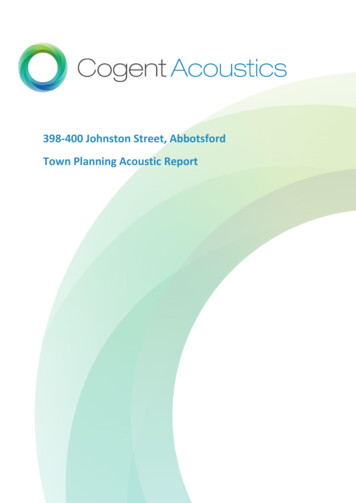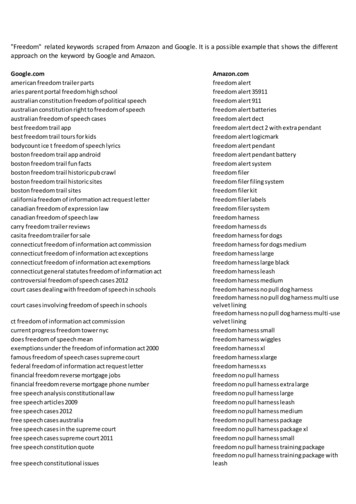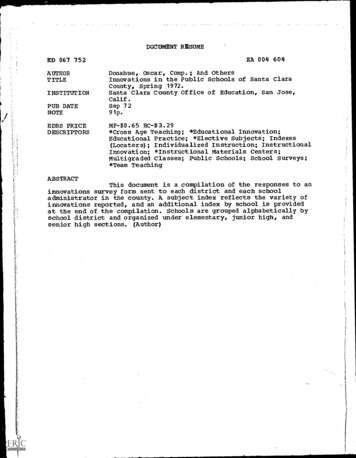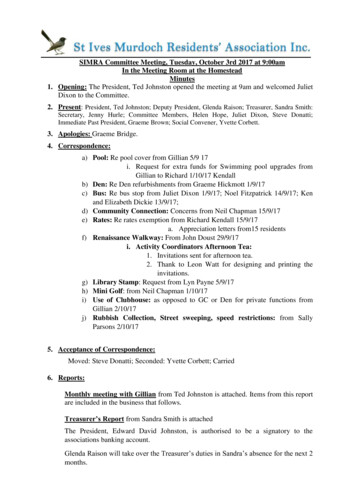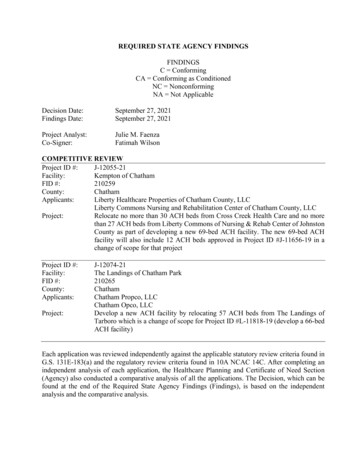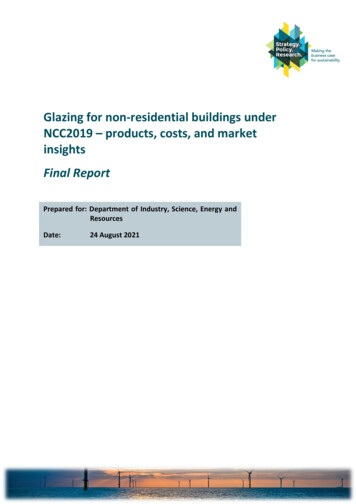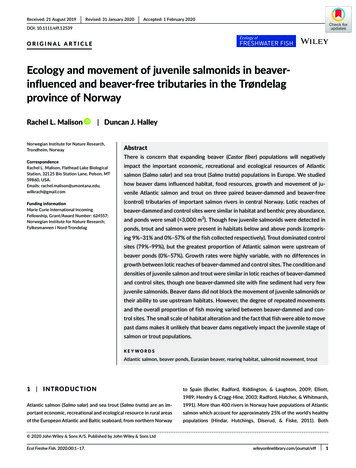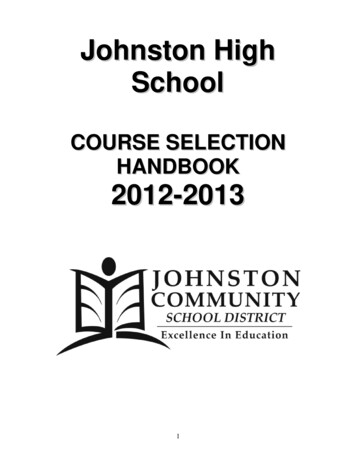
Transcription
Johnston HighSchoolCOURSE SELECTIONHANDBOOK2012-20131
JOHNSTON HIGH SCHOOLEDUCATIONAL PROGRAMWelcome to Johnston High School. We hope that you will find our school to be a goodplace to learn and grow. There are many opportunities for you here and we hope youtake advantage of them.The following pages represent a brief summary of the courses and activities offered tohigh school students at Johnston High School.The program is arranged to provide for the individual needs of all students throughrequired courses, elective courses and school activities. Because each student differsin abilities, aptitudes, talents and interests, the school program is designed to permitindividual expansion into those areas of learning and activity, which will permit optimumeducational growth and personal development.Members of the faculty and administration are ready to help you with both youreducational and personal concerns whenever necessary. If you have any questions,please notify the High School Guidance Office at 278.0779 or the High SchoolAdministrative Office at 278.0449.Non Discrimination StatementIt is the policy of the Johnston Community School District not to illegally discriminate onthe basis of race, color, national origin, gender, disability, religion, creed, age (foremployment), marital status (for programs), sexual orientation, gender identity, andsocioeconomic status (for programs) in its educational programs and its employmentpractices.There is a grievance procedure for processing complaints of discrimination. If you havequestions or a grievance related to this policy please contact the district’s EquityCoordinator, Dr. James Casey, Associate Superintendent, 5608 Merle Hay Road,Johnston, Iowa, 50131, (515) 278-0470, jcasey@johnston.k12.ia.us.2
TABLE OF CONTENTSOverview of Johnston High School4Grading Policy4Academic Honors and Awards4Athletics, Activities and Organizations 5Graduation Requirements6Academic Information8Testing by Grade12Course PlanningRecommended Curriculum for Students Planning on Post-Secondary EducI Have a Plan IowaSuggested Standardized Test Opportunities13131313Course Offerings for 2012-201314Course Description by DepartmentArt & Design22Business Education25English28Family & Consumer Sciences37Industrial Technology40Mathematics45Music51Physical Education and Health55Science58Social Studies62World Language65Non-Departmental68Special Education70Central Campus Classes71DMACC - On Campus Career Advantage Program803
OVERVIEW OF JOHNSTON HIGH SCHOOLI. ABOUT OUR DISTRICTJohnston High School is a rapidly growing, comprehensive public high school located on the northwestedge of Des Moines, Iowa. Current enrollment in grades 10-12 is approximately 1,300. The communityis a suburban area.The population of the district is diverse. The core of the town of Johnston is well established. Many newhomes and apartments are being built in the community of Johnston. In addition, new growth is takingplace in Des Moines, the city of Urbandale and near Saylorville Lake. All three areas are within the schooldistrict boundaries.II. GRADING POLICYA dual reporting system is used. Both an unweighted 4.0 scale and a weighted 5.0 scale will be reported.Both weighted and unweighted grade averages and class ranks will be displayed on transcripts.Unweighted grades are awarded on an A's 4.0, B's 3.0, C's 2.0, D's 1.0, F 0 basis. Individualteachers determine what is needed to achieve these grades. Teachers may award or - grades, butthese are not reflected in the GPA (Grade Point Average).In the weighted grading calculation, A's 5.0; B's 4.0; C's 3.0; D's 2.0, F 0.The following classes will be weighted:a. Advanced Placement courses as developed and approved by the College Board.b. PSEO classes that have been approved by the Principal or designee.c. Prior approval for enrolled students.d. Transfer transcripts will be evaluated by Principal or designee and weightingassigned based on local weighted course standardsAll students, except special education students who spend most of the day in a self-contained classroom,are included in the grade point averages and class rankings.DMACC Classes: Students may choose to take dual credit DMACC courses for credit hours. While JHSdoes not use the “ ” or “-“ grade designations, DMACC does.III. ACADEMIC HONORS AND AWARDSJohnston High School intends to honor and recognize those students who excel in the classroom. Avariety of awards are bestowed, a few of them being: Academic LetterThe highest academic honor bestowed is an Academic J. An academic letter will be awarded to studentsin grades 9-12 who have achieved high honors for each semester. High honors is defined by a 3.75G.P.A. or better for each semester of the school year.4
Honor RollStudents who have a G.P.A. of 3.0 or better for a semester grading period will be listed on the honor roll.All grades will be used in computing G.P.A. for the honor roll. Plus and minus marks will not be used.The Honor Roll at Johnston High School is three tiered, and done by semester.High Honors are awarded for a G.P.A. of 3.75 or above.Honors are awarded for a G.P.A. of 3.25 to 3.74.Honorable Mention is awarded for a G.P.A. of 3.0 to 3.24. National Honor SocietyThe National Honor Society is an honorary organization. Students are selected for membership by theFaculty Council on the basis of scholarship, service, leadership, and character. Membership is neverconsidered solely on the basis of scholarship. Selection of members is during second semester of thesophomore and junior year. Only students who have been in Johnston High School the equivalent of onesemester may be considered for membership, and have a cumulative grade point of 3.50. At the time ofselection, all students who are scholastically eligible are notified of the procedure to follow for furtherconsideration of membership into National Honor Society.IV. ATHLETICS, ACTIVITES AND ORGANIZATIONSFor a complete list of activities, clubs and organizations please go to theJohnston High School school/index.phpor Johnston Moodle /index.php- To enter please log in as guest**Copies of this handbook will be available at the Johnston High School Main Office or theJohnston Middle School Main Office5
GRADUATION REQUIREMENTSJohnston High School is continually striving to enhance the educational quality of its program. This effortincludes revising graduation requirements to meet the changing needs of students. The following areminimum graduation requirements for Johnston students. Most students will choose to go beyond theminimum requirements needed for graduation.The traditional high school experience is four years. Students may either accelerate or slow down theirstudies to arrive at graduation. For purposes of classification, credits will be determined at the end of theprevious school year. Students intending to accelerate their studies need to plan their high school coursesequence accordingly. Students should schedule an appointment with a guidance counselor to arrangetheir schedules.Students successfully completing recommended loads should earn enough credit to graduate in fouryears. Less than the recommended number of classes may result in extra years required to graduateand/or loss of athletic eligibility.Required Credits for Graduation 24Required Courses for GraduationEnglishMathScienceSocial StudiesTechnologyPEHealthElectives4 Credits (8 semesters)3 Credits (6 semesters)3 Credits (6 semesters)3 1/2 Credits (7 semesters) to include one semester of Topics in History,one year each of World Studies, U.S. History and American Government.1/2 Credit either Computer Application or Graphic Communications.1 Credit (1/8 credit each semester) During the school year students may beexcused from taking P.E. for one semester. PE will be waived if they have a full(8 periods) schedule.1/2 Credit (1 semester)8.5 CreditsTOTAL CREDITS24 credits (the term ‘credit’ is the same as the term ‘unit’ in BoardPolicy 605.4)EXPLANATION OF CREDITS1/2 credit is earned per class each semester with the following exceptions:Extended Period Class1Coop WorkPE1/8Freshman ChorusMixed Chorus1/4SynergyInnovation1/8Driver's Education does not count as a credit toward graduation.11/41/8GRADUATIONStudents classified as Seniors may plan on graduation. Seniors who have developed a plan and areaccepted and approved by the Johnston High School administration for fulfilling Johnston High Schoolgraduation requirements in the summer following their senior year, may participate in commencementceremonies.Any student who has met the requirements for graduation and who follows the rules set by theadministration for the ceremony will be allowed to participate in commencement ceremonies. If, for anyreason, a student fails to participate in commencement ceremonies, the student shall still receive his orher final progress report and diploma for completion of graduation requirements.6
EARLY GRADUATION (Policy 505.8)Generally, students will be required to complete the necessary course work and graduate from highschool at the end of grade 12. Students may graduate prior to this time if they meet the minimumgraduation requirements as stated in board policy, and have approval of the Board and arecommendation by the high school principal. Any student needing early graduation, must submit a letterthto the high school principal by August 15 stating the reason for such request and the intended date ofearly graduation.Upon graduation a student will no longer be considered a student and will become an alumnus of theschool district. The student who graduates early may participate in Commencement exercises.7
ACADEMIC INFORMATIONCOURSE LOADSthAll 10 and 11th grade students - six (6) courses plus physical education. No early dismissal or latearrival.12th grade students - six (6) courses plus physical education. Seniors still have the possibility of latearrival or early dismissal dependent on the student’s individual schedule.SCHOLARSHIP RULEStudents that are involved in athletics have a “Scholarship Rule” that regulates student-eligibility. Thecomplete rule for students participating in athletics (boys and girls) can be found on the following website: www.ighsau.org under the category called Policy/Guideline updates-Guidance on Scholarship rule36.15 (2). The following information and examples will hopefully better explain the rules.Athletics and Cheerleading All students must be enrolled and receive credit in at least 4 subjects at all times. If not passing all of their classes at the end of the semester, the student is ineligible for the next 30calendar days (eligible on Day 31) in the next interscholastic athletic event in which the studentparticipates. Day 1 is established by the IHSAA and the IGHSAU for the fall, spring, summer,and beginning of winter sports. Day 1 is established by each school following the conclusion ofthe first semester for winter sports. Students must begin and end the season in good-standing in order to satisfy theineligibility requirements.Dance Team and Other School Activities If at the end of a semester a participant receives an “F”, the student is ineligible to participate for aperiod of 30 consecutive school days.thExample 1: A 10 grade student is involved in the Dance Team. She tried out and made the squadthndfor her 11 grade year. At the end of the 2 Semester she received an “F” in one class. She wouldthbe ineligible to perform for the first 30 school days during her 11 grade year (still be allowed topractice, but not perform).thExample 2: An 11 grade student is involved in Mock Trial. At the end of the first semester hethreceived an “F”. He would be ineligible to perform for the first 30 school days during his 11 gradeyear.If you have specific questions related to this information, please contact Gary Ross, Activities/AthleticDirector at 515-278-2407.Vocal Music, Instrumental Music, Speech, Drama and Other School Activities If at the end of a semester a participant receives an “F”, the student is ineligible to participate in anycompetitive event within a period of 30 consecutive school days. Evaluative activities are notimpacted by the eligibility rule (see definitions of competitive and evaluative in #2). If there are nocompetitive events within the 30 school-day period, there would be no loss of eligibility. Evaluative is defined as “an event in which a rating is given.” Competition is defined as “receiving aplace” rather than a rating.thExample 1: An 11 grade student is eligible in “Innovation”, and the student receives an “F” at theend of the first semester. She would be ineligible for the first 30 school days of competition followingst1 semester (for example, the Johnston Invitational would be evaluative since we are performing anexhibition, but the Urbandale Show Choir Invite would be competitive and therefore the student wouldnot be eligible to compete in that event).8
thExample 2: A 10 grade student was involved in Marching Band. At the end of the 2nd semester,the student received an “F”. He would be ineligible to compete the competition marching band eventsstin the fall for the 1 30 school days (not eligible to compete in the Urbandale Marching BandCompetition, but would be able to participate in the Johnston Invite and the halftime of the varsityfootball games since it is not for places and would be considered evaluative).COURSE SELECTION AND CHANGE PROCESSStudents should select courses carefully with the assistance of their families, teachers, and the GuidanceOffice. Requests for course changes should be the exception. We will attempt to construct a schedulethat will let students take the courses they request. Students may not choose/request teacher(s) and theperiod of the day.RETAKING CLASSESStudents may repeat classes previous taken, If students choose to repeat a class the following rules andprocedures will be in effect:o The repeated class must be taken within the district.o Credit will only be awarded once for a class. Students can not gain additional credit byrepeating a class.o The grade earned in the repeated class will be used to calculate the students cumulative GPA.o The original course and grade will show on the transcript, but will not be used in anycumulative calculations.o Students may drop a class they are repeating up to three weeks prior to the end of thesemester. If the class is dropped by the appropriate date, the grade and credit from the earlierclass will remain. The dropped class will not show on the transcript. Courses not dropped bythe appropriate date will be used in the cumulative records and students could lose credit byfailing a class they previously had passed.o Students requesting to repeat a class must complete a "Request to Repeat a Class Form" andreturn it to the Guidance Office.o Repeat courses must be taken within two semesters of completion of the original course.o Students can not repeat a course that has been used as a prerequisite for the subsequentcourse.o Acceptance into a class is subject to availability of seats in the class.o Requests that don't meet the above guidelines are subject to administrative approval.EARLY DISMISSAL/LATE ARRIVALSeniors with late arrival may arrive in time for their first class and may leave after their last class. Thescheduling process will take into account the opportunity for early dismissal/late arrival and will provide it,if possible.AP COURSES (Advanced Placement)College Board Advanced Placement (AP) courses are college level courses and exams. The student mayearn college credit, placement or both by qualifying AP exam grades. Students seeking credit throughtheir College Board AP exam grade should note that individual colleges and universities, not the CollegeBoard or the AP program, grant course credit and placement.CONCURRENT CREDITWhile JHS does not use the “ ” or “-“ grade designations, DMACC does.DMACC—JHS Concurrent Enrollment CoursesJohnston High School is working with Des Moines Area Community College (DMACC) to provide studentsthe opportunity to earn college credit for several Johnston High School classes. College credit can onlybe approved when courses are articulated and instructors meet DMACC certification standards. Gradesfor these courses become part of the permanent college transcript for the student. Current coursesapproved for concurrent enrollment are AP Calculus, AP Statistics, AP Biology, Tech Math I & II, APEnglish Literature and Composition, AP French, AP Spanish, Construction Tech, Welding, AdvancedSpeech and Coop Work Plus. Please consult with the Guidance Counselors for updates and details.9
DMACC courses may not be taught due to the following circumstances:Teacher certificationStudent enrollmentDMACC or State regulations/changesStudents are only eligible for these classes if they are proficient on the Iowa Assessments in Math,Reading and Science. If you drop the DMACC credit portion of these classes, you must also drop the JHScredit. If this date is beyond the JHS official drop date each semester, you will receive an F for the JHScredit portion.CORRESPONDENCE / ONLINE COURSESCorrespondence/Online courses must have prior approval from either the Guidance Counselor orPrincipal. Exceptions must be approved by the Principal.POST SECONDARY ENROLLMENT OPTIONS (PSEO):THE FOLLOWING PROVISIONS WILL BE IN EFFECT ONLY AS PROVIDED BY THE IOWALEGISLATURE.Junior and Senior students are eligible to enroll for high school/college credit under the Post SecondaryEnrollment Act. In addition ninth or tenth grade students who are identified as a gifted and talentedstudent according to the school district's criteria and procedures may now participate under this. Creditearned under this act will count for both high school and college credit. Students may enroll at Iowaregent’s universities, Iowa community colleges or Iowa private colleges. The courses that students selectmust not be offered at Johnston High School. The cost for taking these courses will be paid for by theJohnston Community Schools. However, a student enrolling in a course who drops or fails the class, willbe responsible for reimbursing the district for the cost of the class.High school credit earned will be based on the college credit awarded. Each three (3) credit course willprovide .5 high school credit. These credits will count toward graduation as though they were taken in thehigh school.Students enrolling under this process must provide their own transportation. It is also the responsibility ofeach student to plan a schedule that will work. However, counseling services are available to studentsboth in the high school and through the post secondary institution. Students and parents are encouragedto get a more detailed description of this Act in the Guidance Office prior to enrolling in courses. Studentsmust contact the Post Secondary Enrollment Option Coordinator at Johnston High School to secure formsand to enroll. The Coordinator is located in the Guidance Office. Registration and enrollment dependson notification and regulation provided by each post-secondary institution.It is the intent of Johnston High School to help students take courses at post secondary institutions if theyare eligible, but post secondary institutions may not all agree to participate in the program. SomeColleges have minimum ACT requirements to participate. Please contact a Guidance Counselor forassistance in enrolling.CENTRAL CAMPUS OPTIONSJohnston High School and the Des Moines Community School District have entered into an agreement toallow Johnston students to attend classes at Des Moines' Central Campus. Transportation may beprovided between Johnston High School and Hoover High School, where students will take a shuttle tothe downtown campus. Program brochures are available in the Guidance Office.CENTRAL ACADEMY OPTIONSJohnston High School and the Des Moines Community School District have entered into an agreement toallow Johnston students to participate in the Central Academy program located in Des Moines CentralCampus.10
JR. ROTCJohnston High School Students are allowed to participate in the Junior ROTC program at CentralCampus. The program can be a four year program.CAREER ADVANTAGE COURSESDMACC offers a number of career courses on their campuses that allow junior and senior JHS studentsto earn college credit. Each program requires students to be absent 3 periods per day from JHS.Courses currently available are listed later in this handbook. Program brochures are available in theGuidance Office.EXTENDED LEARNING PROGRAMMINGLEVELS OF SERVICE:The following explains the levels of service offered to students through the extended learning program(ELP). A district JELP meeting is held each fall that further explains programming. Our identification,completed in the spring, is based upon multiple criteria. Students and/or parents may initiate the requestfor ELP services, as well as teachers. Student initiative is important. If you have questions or concerns,please contact Kathy Paul, ELP Coordinator, at the Johnston Middle School or Sue Cline, ELP teacher atJohnston High School. GENERAL ENRICHMENT:This level of service gives the classroom teacher indication of ability. Teachers look for potential needsand provide differentiated curriculum as needed. Qualified students may take an ELP class that meetsdaily or every other day, depending upon schedules. The class is formatted to provide structure forstudents to pursue independent study. Students are offered assistance with high school and collegeplanning to meet their specific needs. Extra and co-curricular activities are encouraged. STRENGTH AREA:This service is for students who excel in one or more academic areas. All above options are available. Inaddition, students may take advanced classes in a particular area of strength. EXTENDED STUDIES:Students at this level of service require a Personalized Educational Plan to provide an academicallydifferentiated curriculum. In addition to the services listed above, students are closely monitored toensure programming provides advanced content.11
TESTING BY GRADEGRADE 9(AllRequired)Iowa Assessments(Required)Measures of AcademicProgress (MAP)Writing AssessmentGRADE 10Reading Assessment(Required)PLAN –practice test for the ACT gives student comparison ofskills to peers in math, science reasoning, English, and reading,identifies career areas of interest, created by ACT.Reading Assessment –Sophomore Reading Assessmentevaluates students’ ability to read a short passage and answer aseries of questions related to author’s purpose and makingconnections to theme. Students are evaluated on theirinferential thinking skills as evidence by their paragraph lengthresponses.Iowa Assessments(Required)MAP (Required)PSATACTSATScience Assessment(Required)Math Assessment(Required)GRADE 12THWriting Assessment- 9 grade Writing Assessment evaluatesstudent’s ability to address a persuasive prompt in a timedwriting situation. Students are scored using the six traits rubricfor persuasive writing, as well as their ability to write a cohesiveparagraph. The six traits include ideas, organization, voice, wordchoice, sentence fluency, and conventions.Iowa Assessments(Required)MAP (Required)PLANGRADE 11Iowa Assessments – given annually by the state of Iowa.Students are measured in the areas of Vocabulary, Reading,Computation, Math, Social Studies, Science and WrittenExpression. These assessments are used to assess studentand school achievement across the nation.MAP-given by skill level, gives student measure of skill level inmath, reading/language and comparison of skills to peers insame grade, created by JHS.PSAT –practice test for SAT, used by National Merit ScholarshipCorporation to select award winners (top 2%), gives comparisonto juniors for math, verbal, and writing, created by SAT.ACT –gives student comparison of skills to peers in math,science reasoning, English, and reading. Identifies career areasof interest, created to predict likelihood of student success infirst semester of college. This test is used by most colleges asan admission requirement.SAT –gives student comparison of skills to peers in math,verbal, and writing, created to predict likelihood of studentsuccess in first semester of college. This test is used by somecolleges as an admission requirement.Science Assessment –designed to assess a student’s criticalthinking and problem-solving skills through interpreting givendata to answer a series of multiple choice and essay questions.ICAM’S –Iowa Collaborative Assessment Modules are taken inMarch/April. These are criterion-referenced tests that measureGeometry standards and benchmarks of the district. This test isthgiven to 11 graders and is scored by a group of teachers statewide in June.ACTSAT12
COURSE PLANNINGOne of your most important tasks while in high school is planning your high school program of study. Thisinvolves decisions based on an understanding of two areas of knowledge, Self Knowledge (yourabilities, interests, and values), and Occupational Knowledge (understanding what careers are availableand the requirements of a career that you are considering entering). In most instances this will involvesome training and/or education beyond high school. This means you must prepare while in high schoolfor courses you will be taking in college, vocational schools, community college, military programs, or onthe-job training programs. It is the intent of Johnston High School to offer the courses listed in thishandbook. However, if enrollment in any class is determined to be insufficient, the course may becancelled.Johnston High School encourages you to meet with your counselor to explore careers and plan acourse of study for high school and beyond.1. RECOMMENDED CURRICULUM FOR STUDENTS PLANNING ONPOST-SECONDARY EDUCATIONJHSGRADUATIONREQUIREMENTEnglishSocial StudiesMathScienceComputers/TechnologyWorld LanguageHealthP.E.ElectivesTotal Credits4.0 Credits3.5 Credits3.0 Credits3.0 Credits0.5 Credits0.0 Credits0.5 Credits1.0 Credits8.5 Credits24 CreditsMINIMUMSUGGESTED COLLEGEPREPARATION (3)4.0 Credits3.5 Credits3.0 Credits (Algebra 2)3.0 Credits (General Chemistry or Conceptual Physics)1.0 Credits2.0 Credits (1)0.5 Credits1.0 Credits8.5 Credits (2)26.5 Credits (3)1. World Language is not usually required for students attending a two-year college. Most fouryear colleges and universities require two years of the same foreign language for admission.Please check with the post-secondary school you are interested in before registering forthese classes.2. Electives chosen should include fine arts that relate to the student’s area ofinterest, increase the student’s breadth of knowledge or be additional courses inacademic areas.3. The best college preparation is achieved by taking the most high schoolcourses and/or the most demanding high school courses.2. I HAVE A PLAN IOWAI Have a Plan offers students a comprehensive computerized program for career exploration andplanning and is required by the state for all high school students. The system includes interest andskills inventories, databases for occupations, post secondary trade and technicalschools/colleges/universities and financial aid resources. Access to the program can be obtained bycontacting the guidance office. I Have a Plan is utilized as part of the JHS Advisement curriculum.The website is www.ihaveaplaniowa.gov.3. SUGGESTED STANDARDIZED TEST OPPORTUNITIESStandardized tests tell a student their skill level in comparison to others. The results can be usedduring course planning in an effort to improve current skill levels. Skill areas of a particular strength orweakness can also be considered in coordination with possible career areas of interest.13
COURSE OFFERINGS FOR 2012-2013COURSELENGTHOPENTOPREREQUISITESOTHERART & DESIGNth9 Grade ArtSem.9ClaySem.10-12Design ISem.10-12Design IISem.10-12DrawingSem.10-12Essentials of ArtSem.10-12Introduction toDrawingSem.9PaintingSem.11-12DrawingPeer Partner ArtSem.10-12Must complete application &submit to instructor for approvalPhoto Art ISem.10-12Photo Art IISem.10-12Design IPhoto Art I0.5 creditBoth Semesters0.5 credit, First and/orSecond Semester0.5 credit, First Semester0.5 creditSecond Semester0.5 credit, First and/orSecond Semester0.5 creditBoth Semesters0.5 creditBoth Semesters0.5 creditSecond Semester0.25 creditBoth Semesters0.5 creditBoth Semesters0.5 creditBoth SemestersBUSINESS EDUCATIONAccounting IAccounting IIYearYear9-1211-12Advertising & SalesSem.10-12Business ApplicationsSem.9Computer ApplicationsCo-op Work (Class &Job)Co-op Work (Classonly)Graphic, Sound &AnimationIntro toBusiness/MoneyManagementIntroduction toBusinessLaw for Bus. & Pers.UseMoney .10-12Sem.10-12Sem.10-12Accounting I/Required C grade**This course does not meet therecommended requirements forthe NCAA clearinghouse or4-yr college admissionMust have 15 hour jobCounts as an elective1.0 credit1.0 credit0.5 creditBoth Semesters0.5 creditBoth Semesters0.5 creditBoth Semesters1.0 credit each semester6 DMACC credits1.0 creditComputer Applications140.5 creditBoth Semestersth1.0 credit, 9 graders arerequired to take bothsemesters0.5 creditBoth Semesters0.5 creditBoth Semesters0.5 creditBoth Semesters
Sports &EntertainmentMarketingSem.10-12Video ProductionYear10-12Journalism, Computer App.or Graphic Communication1.0 creditWeb DesignSem.10-12Graphic, Sound & Animation0.5 creditBoth Semesters0.5 creditBoth SemestersENGLISHFreshman EnglishIntegrated LanguageArtsYear9Year10A Teen in the WorldHeroic Men andWomenJournalismOn the RoadPower of PersuasionSport, Competition &CultureWorking it Out:CommunicatingSem.11-12Frameworks IIntegrated Language Arts0.5 creditSem.11-12Integrated Language Arts0.5 credi
DMACC Classes: Students may choose to take dual credit DMACC courses for credit hours. While JHS does not use the " " or "-" grade designations, DMACC does. . summer, and beginning of winter sports. Day 1 is established by each school following the conclusion of the first semester for winter sports. Students must begin and end the .
